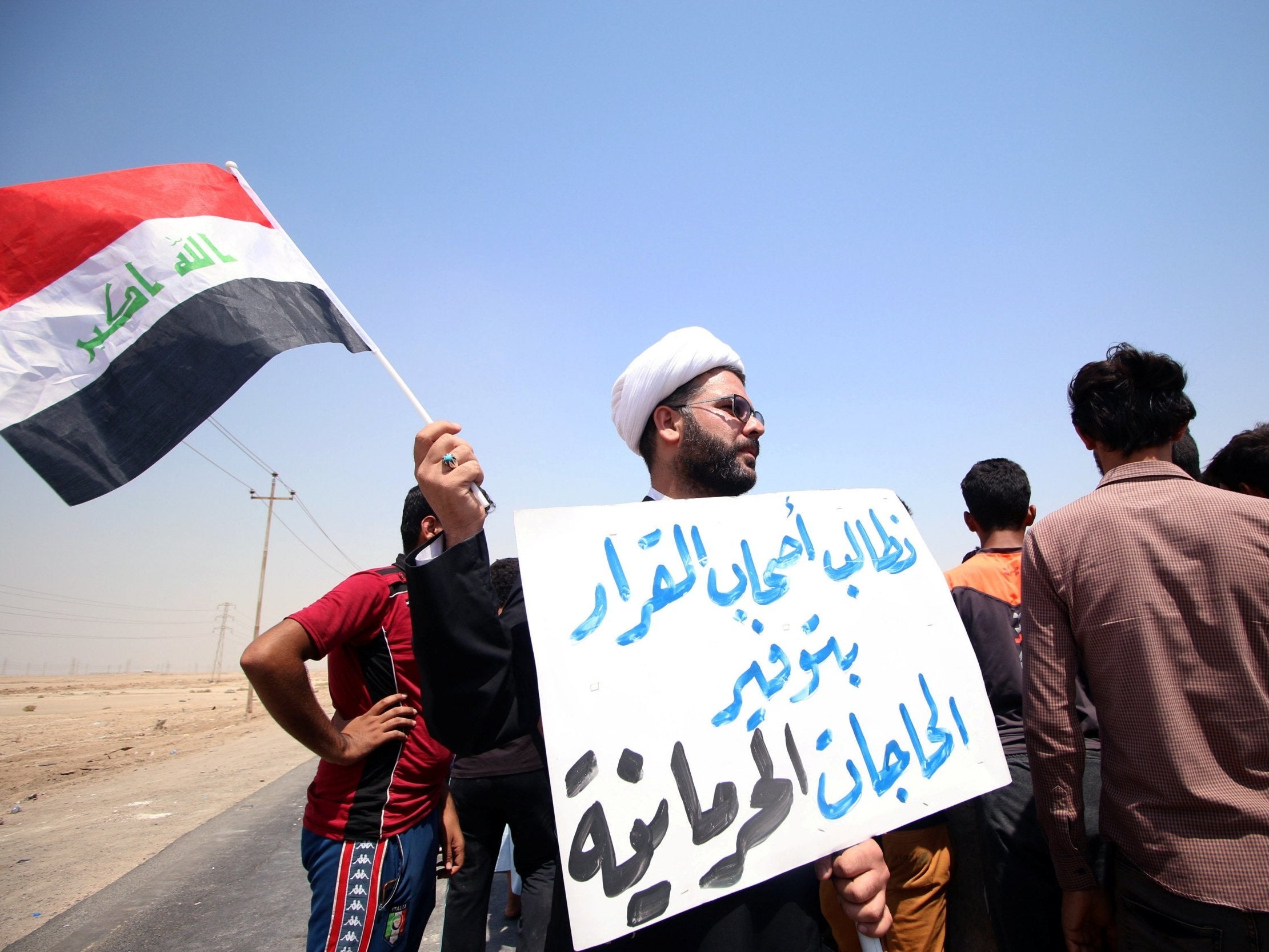Iraq protests: Three killed as oil-rich southern regions rage over joblessness
Living conditions, chronic water shortages and soaring joblessness are behind explosion of anger

Your support helps us to tell the story
From reproductive rights to climate change to Big Tech, The Independent is on the ground when the story is developing. Whether it's investigating the financials of Elon Musk's pro-Trump PAC or producing our latest documentary, 'The A Word', which shines a light on the American women fighting for reproductive rights, we know how important it is to parse out the facts from the messaging.
At such a critical moment in US history, we need reporters on the ground. Your donation allows us to keep sending journalists to speak to both sides of the story.
The Independent is trusted by Americans across the entire political spectrum. And unlike many other quality news outlets, we choose not to lock Americans out of our reporting and analysis with paywalls. We believe quality journalism should be available to everyone, paid for by those who can afford it.
Your support makes all the difference.At least three protesters have been killed and dozens injured in Iraq, after week-long rallies against soaring poverty gripped the oil-rich but neglected south of the country.
On Sunday, security forces fired into crowds in Samawa town, 170 miles south of Baghdad, killing at least two people, when a mob stormed a courthouse.
It followed the death of another protester last Tuesday in Basra, Iraq’s second largest city, where the rallies first erupted.
Dozens have also been injured, including 50 in Basra on Sunday alone. The security forces began a sweep of mass arrests, saying over 30 officers have been wounded.
The rising tide of violence has piled pressure on prime minister Haider al-Abadi, at a time when he is hoping to secure a second term in office following the 12 May parliamentary elections that were marred by allegations of fraud and corruption. Over the weekend he issued a nationwide order placing security forces on high alert.
Activists and journalists told The Independent that terrible living conditions, chronic water shortages and soaring joblessness in southern Iraq, the oil hub and Shia heartland of the country, were behind the explosion of anger.
“The protests have one main demand, employment for the youth. There aren’t any jobs, despite the south being an area of oil, there isn’t even clean water. The terrible facilities make it even worse,” said Ahmed Abdulasmar, a journalist from Basra.
“Around 1,000 service projects have stopped half way through because of money shortages, according to government officials. There are very few schools and almost no fresh water. Those who can’t afford bottled water resort to drinking salty water which makes them sick,” he added.
The protests have one main demand: employment for the youth. There aren’t any jobs, despite the south being an area of oil, there isn’t even clean water. The terrible facilities make it even worse
Activists report that police started arresting “hundreds of people”.
Mr Abdulasmar said that he had confirmation that 20 remain behind bars.
“Most are let go after signing pledges not to participate in further protests,” he added.
Rallies first erupted over a week ago in Basra, a province some 300 miles south of Baghdad that is home to 70 per cent of Iraq’s proven oil reserves but suffers from rising poverty, crippling youth unemployment and crumbling infrastructure.
The rallies quickly spread to surrounding impoverished areas with protesters marching on three major oil fields, West Qurna 1, West Qurna 2 and Rumaila. On Monday at least 200 protesters gathered at the main entrance to Iraq’s Siba natural gas field.
Although the authorities maintain that the demonstrations have not impacted oil and gas exports, the unrest has brought other parts of the south to a standstill.
Iraq’s second busiest airport, in the city of Najaf, was temporarily shut down, causing “heavy losses” after a mob broke into the facility on Friday and damaged the passenger terminal.
Iraq’s vital Um Qasr port on the Persian Gulf, and two main border crossings, Safwan with Kuwait and Shalamcheh with Iran, were closed as protesters had blocked the main roads leading to the sites.
The protests also marked the first time demonstrators stormed major regional government headquarters and even buildings belonging to powerful Shia paramilitary groups.
Mr Abadi’s caretaker government rushed to quell the protests with promises of thousands of jobs in the oil sector, and an urgent allocation of 3.5 trillion Iraqi dinars (£2.6bn) for electricity and water projects. It blamed “infiltrators” for the damages.
But protesters said the measures would do little to appease people as pledges in the past had been broken.
“We are living nearby and watching,” said Salim Khasbawi, a protester outside Siba gas field, “every day hundreds of workers here sitting jobless and can hardly give food to our children”.
Successive Shia-dominated governments have, like Saddam Hussein’s before them, neglected the south of Iraq. Baghdad needs billions of dollars to rebuild the country after battling Isis.
Join our commenting forum
Join thought-provoking conversations, follow other Independent readers and see their replies
Comments